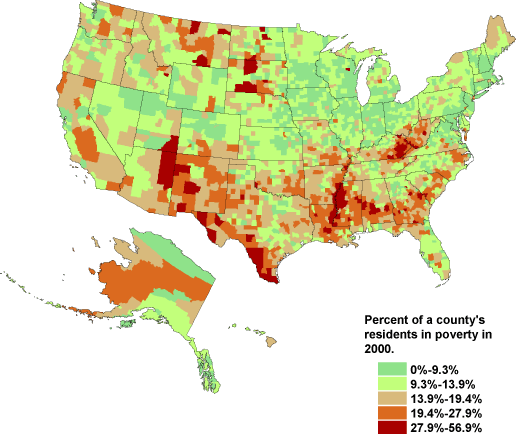
The South has a stereotypical reputation for being racist, trailer-dwelling, uneducated, and slow-witted. Many reasons could probably be cited for these assertions, some based in fact (South Carolina leads the country in % of population living in trailers, Mississipi brings in the lowest % of population with advanced degrees). I can't back it up, but I am confident that the dual economy which existed during the inhumane slavery era (one being progressive and increasingly industrialized, the other being agriculturally-based) and the subsequent collapse of slavery (proper though it was) led to the economic disparity we now see between North and South.
The Real South will rise again - the people of the South are more than these unfortunate stereotypes. They are valuable and strong but sadly overlooked.

The above chart shows that almost all Southern states (including all 3 deep South states of Louisiana, Mississipi, and Alabama) rank in the top 13 in terms of percentage of population living below poverty. Contrast this to the top group:

Virginia stands out as the lone Southern exception, but my guess is that the gaggle of well-paid DC suburbanites looking to avoid the minority throngs of DC streets (see note below) skews its percentage.
A note about Washington DC: Ranks #1 in percent of population with advanced degrees and #2 in highest percent of people living below poverty. Something to ponder. A glut of highly educated kids just out of school trying to make it in government? I'd instead bet that the suit-and-tie folks of the DC professional set are rubbing elbows with the downtrodden minority population being overlooked by the nearby officials and institutions that promise to care for them. DC blows away its nearest competitor (Mississippi) with a whopping 55% of its population being African American. This all says much more about racism and the direct aftereffects of slavery than it does about the subtler economic effects of slavery's collapse, but it's worth noting.
For a more detailed breakdown of poverty data: http://www.censusscope.org/us/map_poverty.html
For more state ranking data: http://factfinder.census.gov/servlet/GRTSelectServlet?ds_name=ACS_2006_EST_G00_&_lang=en_sse=on
I welcome comments, as usual.
No comments:
Post a Comment